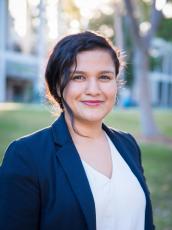Josefina Flores Morales
Department of Sociology, UCLA
Josefina Flores Morales is a current doctoral student in the department of sociology at UCLA. In 2016, Josefina earned a B.A. in psychology with a public health minor from UCLA. Josefina’s research is about how immigration influences status shapes social inequality in the United States. Josefina is in the inaugural cohort of the Health Policy Research Scholars program, supported by the Robert Wood Johnson Foundation, and is excited to continue to work on policy-relevant issues with a focus on the impact of immigration status across the life course. For fun, Josefina enjoys salsa dancing, weightlifting, and playing soccer.
Abstract
Immigration status is a social force that perpetuates inequality
in families in the United States. Recent studies show that the
effects of immigration status spillover from parents and affect
children (regardless of the child’s
immigration status). This study uses the California Health
Interview Survey to investigate how parent-child immigration
status composition influences healthcare insurance coverage of
children before and after the implementation of a Medi-Cal a
policy expansion. In May of 2016, California implemented a
Medi-Cal expansion that would include undocumented minors in the
program. Prior to this change, undocumented minors could gain
access to limited Medi-Cal, which included emergency services.
The logics of the policy expansion rely on the assumption that
undocumented immigrant parents know about and feel safe accessing
Medi-Cal services. A family’s immigration status composition may
shape these the extent to which undocumented children benefitted
from the Medi-Cal expansion. This study enables us to gain
knowledge about whether the immigration status of parents and
their children undermines policies that aim to improve the
welfare of poor children in immigrant families. This study can
inform policies aimed to improve the health and wellness of
immigrant families. If heads of immigrant families with
undocumented family members perceive health institutions as a
setting that may increase the risk for deportation, then families
may rely less on formal healthcare. This study augments the
mission of the University of California Network on Child Healthy
Poverty
and Public Policy, which is to better understand social safety
programs’ effects on improving the life chances of poor children.









